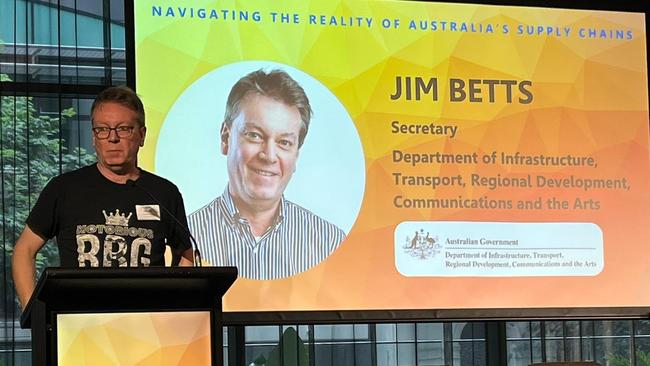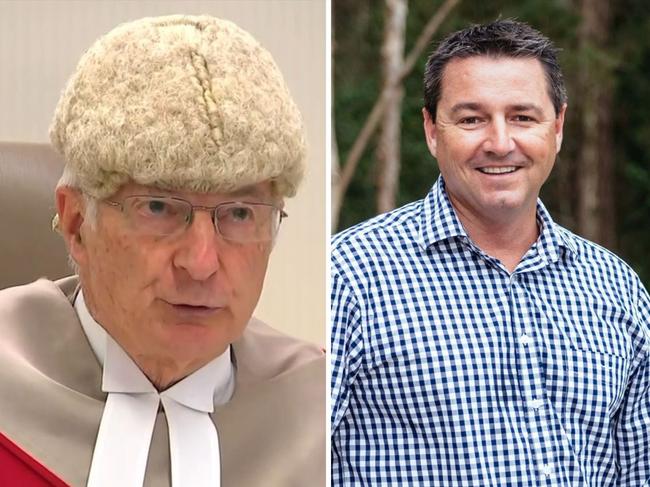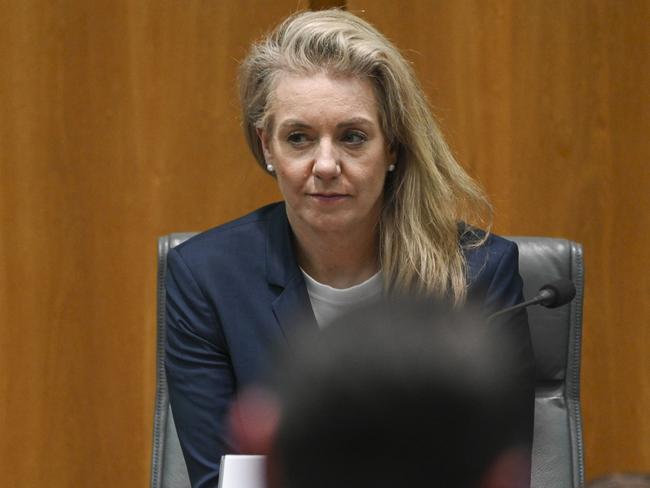Vikki Campion: Judge on actions – or the lack of – not T-shirts
Virtue-signalling public servants should roll up their sleeves, lose the tokenism, and take some effective action, rather than sermonising and sloganeering writes VIKKI CAMPION.

Opinion
Don't miss out on the headlines from Opinion. Followed categories will be added to My News.
Peacocking public servants, thrusting their virtue-signalling plumage straight in our faces, bookended the first week after budget, when you would think cost of living would take prominence.
During Monday’s Senate estimates, a top member of the executive, the head bureaucrat of the Department of Infrastructure, launched a self-aggrandising sermon about wearing a T-shirt with an Aboriginal flag and a clenched black fist to an all-staff meeting.
Yet he could not answer questions about employing Indigenous people on government infrastructure projects.
On Thursday, NSW Supreme Court Justice Ian Harrison judged Nationals MP Pat Conaghan as racist for refusing to support the Voice, drawing his character assassination on just 15 minutes of Conaghan’s life.
The simplest research would have revealed that while Harrison was writing missives, intoxicated by the thesaurus, Conaghan had been concentrating on giving Aboriginal mothers a roof as they escaped the fists of their partners in Kempsey, providing medical clinics to Indigenous communities, and redirecting Aboriginal youth from a lost life of crime and despair into skills and jobs.

While Secretary Jim Betts was passionate about his T-shirt, issuing long moralistic monologues, he showed disinterest in helping Aboriginal workers kicked off government construction sites by the CFMEU.
Betts waxed lyrical about his T-shirt, delving into the history of the clenched fist, in a passionate sermon of more than 600 words, comparing wearing the black fist as solidarity with Aboriginals with his rainbow lanyard’s “solidarity with the LGBTIQ+ community”, but once he moved from his apparel virtue, he got stranded in one-word answers about his actual job.
When Betts was grilled on media reports about an unnamed Indigenous labour-hire firm that had been kicked off nine government projects by the CFMEU, he had short, single-phrase answers or deflected responsibility for answering to colleagues.
Although he lauded his understanding of the Aboriginal black fist movement, he seemed surprisingly ignorant of the struggles of Aboriginal people contracted in his department’s projects.
“No,” he was not aware of it, then he dismissed it as “a matter for the Victorian government”.
He should put that on his T-shirt.
Indigenous employment targets on Commonwealth infrastructure projects were, on average, 3.5 per cent, yet apparently the executive had no interest in seeing them enforced.

When Nationals Senator Bridget McKenzie pointed out the whole point of having targets was so the Department could give Indigenous Australians a career in construction, Betts appeared entirely disinterested in the subject, waiting for more appropriate questions such as on his wardrobe of other activist causes.
When McKenzie said: “What I’m hearing is the department cares less about that and can’t even be bothered to avail yourselves of every publicly-available article about Indigenous labour-hire companies getting kicked off nine projects”, Betts was mute.
Department of Infrastructure reports show about 2.5 per cent of his staff are Aboriginal or Torres Strait Islander – some 43 of more than 1700 people – which is less than the proportion of Indigenous people in Australia or in parliament.
It’s emblematic of the pervasive culture in government departments – the virtuous Department of Infrastructure, tongue-tied when it comes to employing Aboriginals.
Then Cowper MP Pat Conaghan woke up to an email signed off from Justice Harrison which stated: “I was moved while listening to you speak to write to you now to express my complete sadness, not that you have predictably taken the stand that you have, but that you obviously do not understand or appreciate the depths of paternalism and racism that oozed from your words.
‘NIGGARDLY AND CRUEL’
“Your position, and the position of your party, is niggardly and cruel and mean-spirited. It is patently based upon a political stance that is indecent in its ignorance.”
His judicial colleagues, in appointing him to the Supreme Court, called him “uniquely objective” and “calm and measured” – if that is the description of calm and objective, are these attributes to be mimicked by his colleagues in the High Court when they interpret the powers of the Voice?
There has never been an Aboriginal judge in the High Court, a tightly held club; while Harrison is on full roar, he should fire another sanctimonious missive off to them.
Harrison has judged Conaghan’s character as racist from a mere 15-minute speech. He failed to inform himself of Conaghan’s history or life – that, as a person born in Kempsey, he has had first-hand experience of Indigenous issues in regional Australia, an area with 20 per cent youth unemployment, the highest in the nation, compared with Harrison’s struggle through the WASP-ish, leafy ghettos of Sydney’s North Shore.
Some of Conaghan’s “niggardly”, “cruel”, “mean-spirited” and “racist” work has resulted in $6.5m to build 26 units for homeless youth, mothers and children escaping domestic violence in Kempsey, which goes straight to Closing the Gap targets.
He’s championed support for ShoreTrack, a not-for-profit that takes vulnerable young people disengaged from the community and gives them support, skills and training.
In his maiden speech, he referred to his own electorate as: “The traditional lands of the Birpai, Djangadi (Dunghutti) and Gumbaynggirr people, whose connection goes back for tens of thousands of years”.
With just a modicum of research, Justice Harrison would have discovered this is hardly the actions of a bigot. As a highly-paid judge, it is dangerous to imply racism and, in so doing, to impugn the motives of people with a different view of you.
Betts, spare us the tokenistic rubbish when you are in one of the most privileged positions in the country to help.
And Harrison, next time you want to discuss closing the gap, try meeting Conaghan at ShoreTrack.
More Coverage
Originally published as Vikki Campion: Judge on actions – or the lack of – not T-shirts





